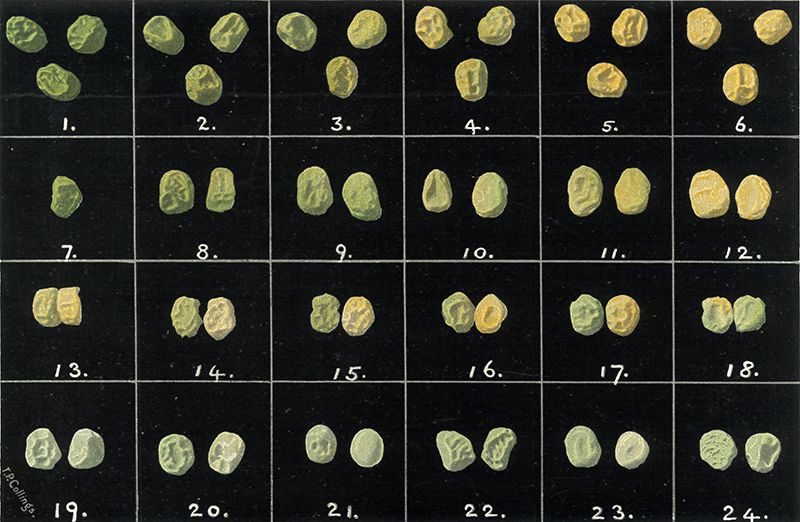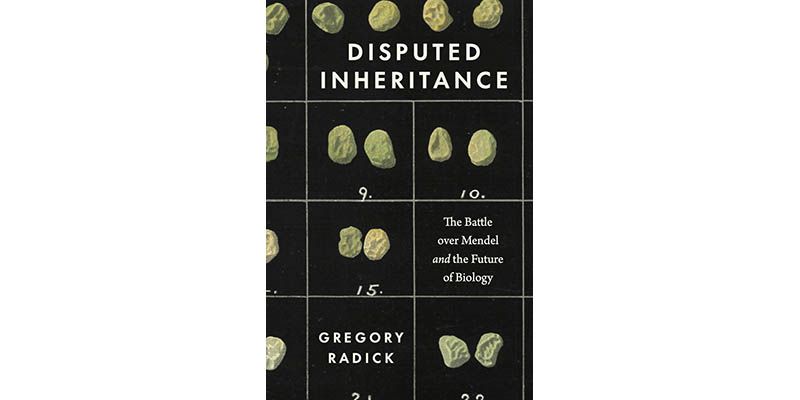Belief in stereotypes – oversimplified or outright false ideas about what certain kinds of people are like or capable of – plays into many racial and gender inequalities, and even our prejudices about ourselves. Science education should be an effective means of combatting stereotypes. But what if the standard biology curriculum in fact eases acceptance of stereotypes, potentially making inequalities harder to eliminate?
This was what Gregory Radick, Professor of History and Philosophy of Science at the University of Leeds, began to suspect when he delved into the history of genetics.
The rise of Mendelism – and a forgotten critic
Around the world, at every level of education, students learn that an Augustinian monk experimenting with peas in the mid-19th century is the ‘father of genetics’. Gregor Mendel found that after crossing a pea plant from a variety that produced, for example, seeds that were always yellow, with one from a variety that produced seeds that were always green, all of the offspring seeds were yellow. However, in the next generation, green seeds reappeared, at a ratio of one green to three yellow. Mendel coined the terms ‘recessive’ and ‘dominant’ to characterize this difference in behaviour.
Familiar to specialists but otherwise little known, Mendel’s paper on his experiments attracted wider attention only from 1900, long after his death. Within a few years, a steadily growing band of ‘Mendelians’ were building a new science of inheritance – first called ‘Mendelism’ and then ‘genetics’ – which took Mendel’s paper as its starting point. But not everyone was convinced. An especially fierce debate was centred in England, where the new Mendelism found its most energetic champion in the Cambridge-based William Bateson and its most implacable opponent in the Oxford-based W F R Weldon.
In 1902, Weldon published an initial critique including a photograph showing that the seeds of pea plants grown by people other than Mendel were not, as Mendel had claimed, either all-green or all-yellow, but exhibiting colours everywhere on the spectrum between deep green and deep yellow. From 1904, Weldon began work on a book setting his criticisms within a new, comprehensive theory of inheritance.

Photograph illustrating the deep-green-to-lemon-yellow range of colours found in hybrid pea seeds, from a 1902 article by W F R Weldon. Credit: University of Leeds.
“What bothered Weldon immensely was the way that Mendelism reinforces the idea that traits are uniform and unchangeable, as if caused by nothing other than inherited factors ‘for’ those traits,” says Professor Radick. “In reality, traits are often influenced and affected by many different factors, which can make them highly variable. It also means that traits aren’t necessarily fixed, but can change as organisms grow and develop.”
“Biologists nowadays take for granted that heredity isn’t destiny, because a given bit of chromosome can have very different effects on a body depending on context. Weldon reminds us that, even at the beginnings of genetics, a well-informed biologist regarded that as fundamental.”
Introducing students to the Weldonian approach
Weldon died unexpectedly in 1906, at the age of 46, with his book unfinished and unpublished. But what if history had taken a different path, and Weldon had lived long enough for the book to come out? Would its ‘context matters’ perspective on heredity have made a difference to what happened afterwards?
Professor Radick decided to find out. A good place to start, he decided, was with the way that introductory genetics is taught. Working with Dr Jenny Lewis, a genetics education expert, and Dr Annie Jamieson, a developmental biologist turned historian of science, he set up a project to devise a Weldonian genetics course which Dr Jamieson then taught to second-year humanities students. Their attitudes to the idea that heredity is destiny – known as “genetic determinism” – were assessed before and after teaching. At the same time, an equal number of first-year biology students taking the standard Mendelian introductory module were assessed in the same way.
The results were previewed in Nature in 2016 and published in 2017. The researchers found that, before teaching, the two groups of students had very similar attitudes to genetic determinism. After the courses, however, there was a marked difference between the two. The students who’d followed the Mendelian course on average showed no change – if anything, they became a little more deterministic about genes. However, the students who’d followed the Weldonian course on average became less deterministic.
Taking the research to the next stage
The study findings have sparked the interest of teachers and researchers internationally. In Brazil, a nationwide enrichment course for secondary-school biology teachers dealt in depth with the Weldonian approach. In the USA, the links between ways of learning genetics, attitudes to stereotypes — whether about peas or people — and motivation to study science are currently under investigation as part of a $1.2 million study funded by the National Science Foundation’s Improving Undergraduate STEM Education initiative.
Launched in 2020, the NSF study is co-led by Professor Radick with Dr Brian Donovan, based at BSCS Science Learning in Colorado, and Professor Michelle Smith, a biology education specialist at Cornell University. At the heart of the new study are randomized controlled trials involving over a thousand university students, across the US and beyond, who will undertake self-guided online tutorials on genetics topics presented in either standard or ‘Weldonised’ form.

A statue of Mendel, unveiled in 1910 and now on the grounds of the monastery in Brno (then Brünn) where Mendel did his experiments.
“For a historian of science, it’s hugely rewarding to see how ideas previously mouldering away in the archive can be brought back to life in such a positive way,” says Professor Radick. “Biology teaching that doesn’t inadvertently bolster student misconceptions about genes can potentially help genetics to become part of the solution to inequality instead of being, as it’s too often been, part of the problem.”
The Leeds curriculum study features prominently in Professor Radick’s new book, Disputed Inheritance: The Battle over Mendel and the Future of Biology, published in 2023 by the University of Chicago Press.

Disputed Inheritance was shortlisted for the 2024 Pickstone Prize from the British Society for the History of Science. Credit: University of Chicago Press.